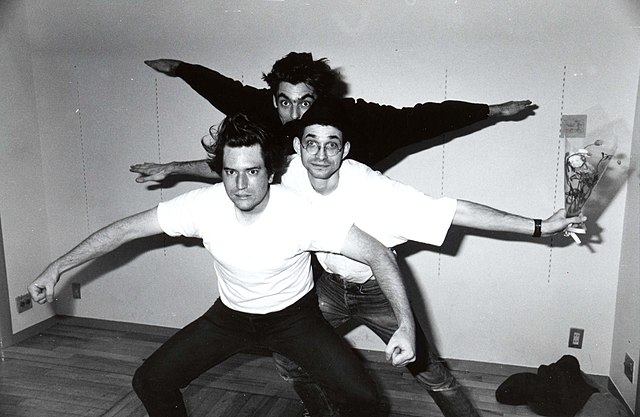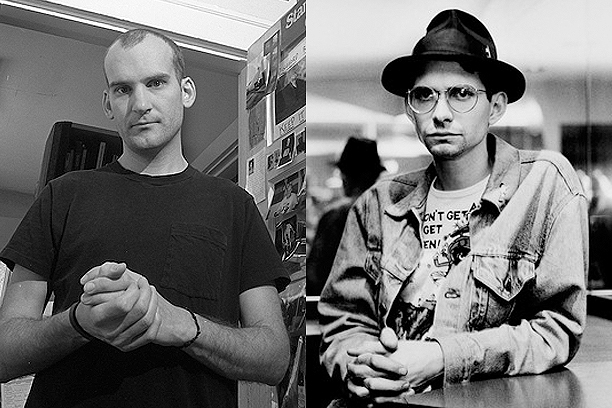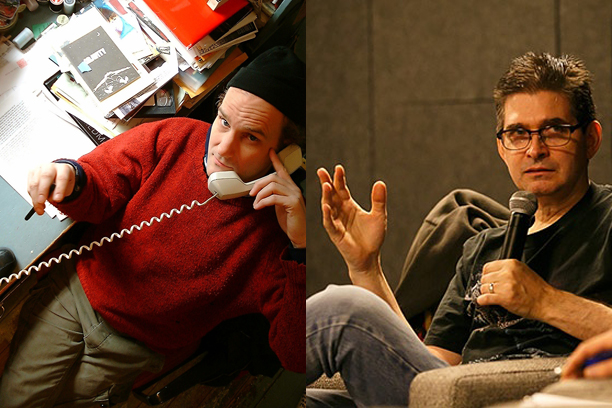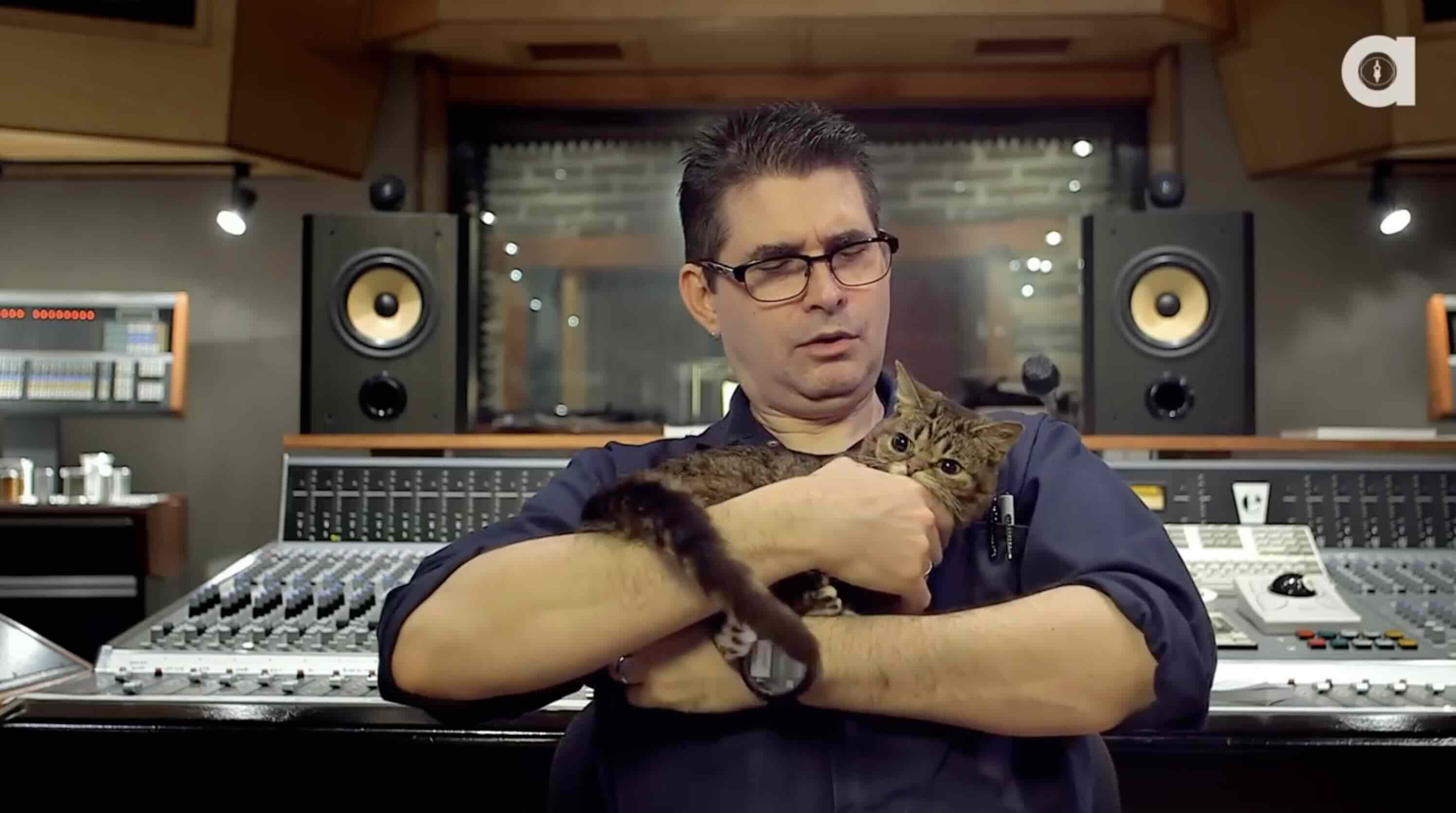Steve Albini

Albini performs at ATP festival in 2007. Photo by Shannon McClean
You know, if you're in love with somebody, you just don't love the nice things about them. You think their morning breath is amazing, you know.
--Steve Albini[1]
Steve Albini was an astonishing person.
About him, I recently read an article that started 'Steve Albini doesn't need an introduction, he needs an index.'
I mean, not only did he sound-record engineer over 1,500 music recordings[2], but also affected musicians and how people view music in ways that are unmeasurable. He also made a lot of mistakes in life, like any person; what differs him from many middle-aged white guys is that he publicly not only accepted his mistakes but showed his vulnerabilities[3] for all to learn from.
He recorded Pixies, Nirvana, Breeders, Jimmy Page and Robert Plant, PJ Harvey, among others.
Most people haven't heard of Albini. That's naturally OK; if you care about music, your ignorance should stop here.
Albini's views on music in relation to capitalism and overall greed are very valuable and should serve as knowledge-based milestones for people who want to understand how money works in relation to music.
One of the most important essays that Albini wrote is The Problem with Music[4], an exposé of how the music industry is designed to kill the people who make music. From the start of the essay:
Whenever I talk to a band who are about to sign with a major label, I always end up thinking of them in a particular context. I imagine a trench, about four feet wide and five feet deep, maybe sixty yards long, filled with runny, decaying shit. I imagine these people, some of them good friends, some of them barely acquaintances, at one end of this trench. I also imagine a faceless industry lackey at the other end, holding a fountain pen and a contract waiting to be signed.
Nobody can see what’s printed on the contract. It’s too far away, and besides, the shit stench is making everybody’s eyes water. The lackey shouts to everybody that the first one to swim the trench gets to sign the contract. Everybody dives in the trench and they struggle furiously to get to the other end. Two people arrive simultaneously and begin wrestling furiously, clawing each other and dunking each other under the shit. Eventually, one of them capitulates, and there’s only one contestant left. He reaches for the pen, but the Lackey says, “Actually, I think you need a little more development. Swim it again, please. Backstroke.”
And he does, of course.
Throughout the essay, Albini breaks down costs that are, largely, paid by the band, although they didn't realise any of those things by the time they signed a contract. It's a horrifying piece of paper. I've spoken with several people who wish they'd read the essay before signing anything; most of these people are still in debt, trapped by company parasites who masqueraded as friends.
As you can tell from his writing, Albini had both a pitch-black and intricate sense of humour. He was ultra-funny, something which is evident in the lyrics he wrote for Shellac, one of the bands he was in.

Shellac in Shibuya, Japan, c. November 1993. Front to back: Weston, Albini, and Trainer.. By Masao Nakagami, CC BY-SA 2.0, https://commons.wikimedia.org/w/index.php?curid=8757144
I discovered Shellac far too late. I'm catching up. Today, as I write this, marks ten days since Albini died. Today also marks the release of To All Trains, the latest Shellac album. It's harrowing to know we can listen to a podcast episode[5] where Albini walks us through each song on the album; it was recorded on 2024-04-23.

Shellac in 2024.
The album is wondrous. Fucking brilliantly recorded and played. The lyrics are playful, intricate, searching. Human. The songs breathe. It's too short an album.
The last time I felt like this following the death of someone I didn't know personally was when David Berman died. He and Albini shared wit, warmth, and care for others. Both deeply helped other peoples, especially young ones, and both answered everyone who contacted them, almost always with sincerity and kindness.
Have a browse through Albini's bluesky account. He posted stuff all the time, always with a level-headed and clear-eyed mind. There's a lot to find by going through his posts.
He said something lovely in an interview[6] with Emily Pothast for The Wire, about growing up in the punk scene:
I feel like being formed in that scene tempered me as a person and made me rational and comfortable with less, is a way to describe it. And those scenes were all full of such freaks and weirdos, you know? Like having a guy in your band whose profession was that he was a weed dealer wasn’t a big deal. That was normal. Or having friends who were, like, part time prostitutes or whatever. Or having, you know, like people in the underground – like the real underground of society – all around you. That was normalised. And that also kind of tempered me as a person, made me more open minded about what kind of people are legitimate and what kind of people I should take seriously. I feel like all of that to me – that scene and those people formed me as a person. And I’m grateful for it. Because I know that I was susceptible to influence because they influenced me. And if I had fallen in with an uglier or dumber crowd, I would be a dumber and uglier person.
Check out his letter to Nirvana[7] in response to having been approached by them to record the follow-up to Nevermind, at a time when they were the biggest band on the planet. Here's one of my favourite parts of the letter:
#5: Dough. I explained this to Kurt but I thought I'd better reiterate it here. I do not want and will not take a royalty on any record I record. No points. Period. I think paying a royalty to a producer or engineer is ethically indefensible. The band writes the songs. The band play the music. It's the band's fans who buy the records. The band is responsible for whether it's a great record or a horrible record. Royalties belong to the band.
I would like to be paid like a plumber: I do the job and you pay me what it's worth. The record company will expect me to ask for a point or a point and a half. If we assume three million sales, that works out to 400,000 dollars or so. There's no fucking way I would ever take that much money. I wouldn't be able to sleep.
I have to be comfortable with the amount of money you pay me, but it's your money, and I insist that you be comfortable with it as well. Kurt suggested paying me a chunk which I would consider full payment, and then if you really thought I deserved more, paying me another chunk after you'd had a chance to live with the album for a while. That would be fine, but probably more organizational trouble than it's worth.
Whatever. I trust you guys to be fair to me and I know you must be familiar with what a regular industry goon would want. I will let you make the final decision about what I'm going to be paid. How much you choose to pay me will not affect my enthusiasm for the record.
Shellac's last.fm page[8] is inspiring:
Shellac are also renowned for their unconventional modus operandi. Touring is often an excuse for the band to take time away from their day jobs (Albini and Weston are both recording engineers; Trainer works at a commercial photographer's studio in Minneapolis) instead of being used to promote a recent record or even for financial gain. Indeed, Shellac do not have a "fixed fee" for performances like most bands, instead preferring to take the door charge minus expenses such as promotion, running costs and venue fees. They have also been known to ask venues to remove ticket charges they regard as unnecessary, which have become common in Europe and America.
…because, fuck the majors. And fuck live nation, ticketmaster and their ilk.


Ian MacKaye and Steve Albini
Vish Khanna graciously produces a podcast show named Kreative Kontrol where he's not only posted one conversation between Ian MacKaye and Steve Albini[9], but two[10]! It's really just two posts from the same occasion when they spoke, but it contains so much.
A few weeks before Albini's death, he spoke with Aaron Rash[11] about how Nirvana's In Utero was recorded. Imagine that. Albini always spoke with people, regardless of who they were.

He was interviewed by Lil' Bub[12].
I fucking love Nirvana. I suddenly remember my dad opening the door to my boy room; I was 17 years old and lived at home. My dad smiled madly and said: 'Niklas! That drug user that you like? He's dead!' and that's how I found out that Kurt Cobain had died.
In 1996, Heather Whinna, Albini's wife, started a collection for people in need around xmas time. Albini wrote an article about this in 2015[13]. From the article:
Nineteen years ago, my wife Heather Whinna stopped by the post office on the way home. She found bins there full of letters addressed to Santa Claus, left out by the post office for people to read and answer. Curious, she read a few of the letters and couldn't believe what she saw.
These weren't impish requests for toys or a new bike; mostly, they were desperate pleas from heads of households asking for help. It was staggering. People let down by the remnants of a social safety net, without families or abandoned by their families, people suffering sickness, poverty and abuse. People so far out on a limb that they swallowed what pride they had left, took pen in hand and wrote down everything that had failed them, everything that had broken or been stolen, everything that had hurt them and made them feel fear and shame and worry.
They described anguish over their children's needs, their hunger, their lack of appropriate clothing, school supplies and other basic needs.They described homes they could barely afford to stay in, wretched though they were. They described relationships wracked by abuse, the legal system, disease and addiction. They addressed their problems to Santa Claus at the North Pole and sent them by mail into the vacuum of humanity that had left them so desperate.
It seemed impossible, yet there it was. She took one of the letters home and showed it to me. I couldn't help but be moved when I read it, and the realization that there were hundreds -- no, thousands -- of these letters changed something in me.
Between us, we put together a parcel: some clothes, some needed items mentioned in the letter, some money. On Christmas morning, we drove to an address unannounced, found the letter writer and gave her the package. We did the same the next few years for a couple of families, whatever we could manage. Heather works at the Second City theater in Chicago, and concurrent with her letter-reading, Andy Cobb, her colleague at the Second City, produced a marathon 24-hour improv show to raise money for a homeless shelter. Andy and Heather decided to combine their efforts and arranged a 24-hour show at the Second City in December, 2002 to raise money for the letters. That first year, the show allowed us to help even more families, turning Christmas morning into an all-day affair.
This is altogether lovely. He spoke about this together with Fred Armisen in a podcast episode for Kreative Kontrol back in December 2023[14].
Rapeman
Albini thought white guys like himself should have been called out more. Kathleen Hanna is a punk from Washington, USA. She fronts bands like Bikini Kill and Le Tigre. Her autobiography, Rebel Girl, was published in May, 2024. Here's a bit from the book:
Before the tour, Viva Knievel had talked about the coolest things that could happen to us on the road. Zeb said recording with Albini was her ultimate dream. I’d never listened to his band Big Black, but I knew it meant a lot to Zeb—so we tracked down Albini while we were playing around Illinois and Luke set up a studio date. Besides our demo, which we recorded live, and the four songs we’d done in Tim Mac’s garage, I had zero recording experience. So when this big-time producer was snickering at me between vocal takes, I started thinking I really sucked.
When we went into Albini’s mixing booth, I noticed a big sticker on one of his speakers. It said “RAPEMAN.” I asked him what “Rapeman” was, and he told me it was one of his bands. “Why is your band called Rapeman?” I asked. “We named it after a comic book where the superhero is a rapist,” he replied. I walked outside and sat on the stoop and held my hands over my ears, just like I used to when my dad and my sister fought. But this time I had my hands over my ears so I didn’t have to hear the shitty mix Steve Albini was doing of our songs. When I returned to Olympia, I threw the tape out of my apartment window.
Albini spoke about in a podcast interview[15] in 2020 about the choice of Rapeman as a band name as 'a flippant choice we made at the time', 'unconscionable' and 'indefensible':
At the time, I was somewhat deaf to feminism and I was somewhat deaf to the arguments of vulnerable people. Because, again, because of my privilege, I didn't feel vulnerable myself, so I was fairly deaf to it. And that's a failing on my part, that's on me. I made a fundamental error when we were… During that era, I equated leftist critique, that may have been slightly ignorant but was legitimate, I equated that critique with a kind of right-wing puritanical critique because they both seemed ignorant of our intent. And, so, I erroneously equated them without acknowledging that the progressive critique of naming your band 'Rapeman' is an order of magnitude more legitimate than a puritanical critique of just not liking to see the word 'rape'. And my fundamental mistake was conflating those two. And that's how I maintained an indifference to the criticism. [...] I'm very proud of the music we made, I'm very fond of the experience of being in that band [...]. Naming the band is the single, but also the defining, regret of that whole episode.
It's important to note these things. Like I've written elsewhere in this article, he learned from some mistakes[3:1].
Aaron Rash. How Steve Albini Recorded Kurt Cobain’s Guitars on In Utero - an in Depth Interview, 2024. https://www.youtube.com/watch?v=MOWP_laIXAs. ↩︎
“Steve Albini Discography,” Wikipedia, May 9, 2024, accessed May 9, 2024, https://en.wikipedia.org/w/index.php?title=Steve_Albini_discography&oldid=1223016085. ↩︎
Gordon, Jeremy. “The Evolution of Steve Albini: ‘If the Dumbest Person Is on Your Side, You’re on the Wrong Side.’” The Guardian, August 15, 2023, sec. Music. https://www.theguardian.com/music/2023/aug/15/the-evolution-of-steve-albini-if-the-dumbest-person-is-on-your-side-youre-on-the-wrong-side. ↩︎ ↩︎
Albini, Steve. “The Problem with Music” The Baffler, December 30, 1993. https://thebaffler.com/salvos/the-problem-with-music. ↩︎
Khanna, Vish. Ep. #869: Steve Albini. Kreative Kontrol. Accessed May 17, 2024. http://vishkhanna.com/2024/05/15/ep-869-steve-albini/. ↩︎
Pothast, Emily. “‘I Wanted It to Be for Keeps’: An Oral History of Shellac - The Wire.” The Wire Magazine - Adventures In Modern Music. Last modified April 15, 2024. Accessed June 13, 2024. https://www.thewire.co.uk/in-writing/interviews/i-wanted-it-to-be-for-keeps-an-oral-history-of-shellac. ↩︎
Albini, Steve. “Letter from Steve Albini to Nirvana.” Accessed May 9, 2024. https://stevefrenzel.github.io/steve-albini-letter/. Archived copy of the letter, should the URL not work: https://archive.ph/IGFu1 ↩︎
Last.fm. “Shellac.” Music page, November 17, 2023. https://www.last.fm/music/Shellac/+wiki. ↩︎
Vish Khanna, “Ep. #223: Ian MacKaye & Steve Albini (Part I),” Kreative Kontrol, November 12, 2015, accessed May 17, 2024, http://vishkhanna.com/2015/11/12/ep-223-ian-mackaye-steve-albini-part-i/. ↩︎
Vish Khanna, “Ep. #224: Ian MacKaye & Steve Albini (Part II),” Kreative Kontrol, November 17, 2015, accessed May 17, 2024, http://vishkhanna.com/2015/11/17/ep-224-ian-mackaye-steve-albini-part-ii/. ↩︎
Aaron Rash, How Steve Albini Recorded Kurt Cobain’s Guitars on In Utero - an in Depth Interview, 2024, accessed May 9, 2024, https://www.youtube.com/watch?v=MOWP_laIXAs. ↩︎
Lil BUB, Lil BUB’s Big SHOW Episode 3: STEVE ALBINI, 2013, accessed May 17, 2024, https://www.youtube.com/watch?v=HW4mwjSIkoE. ↩︎
Steve Albini, “Why I Haven’t Had a Conventional Christmas in 20 Years,” HuffPost, last modified November 23, 2015, accessed May 20, 2024, https://www.huffpost.com/entry/why-i-havent-had-a-conventional-christmas-in-20-years_b_8614568. ↩︎
Vish Khanna, Ep. #826: Steve Albini and Fred Armisen | Kreative Kontrol, n.d., accessed May 20, 2024, https://shows.acast.com/kreative-kontrol/episodes/ep-826-steve-albini-and-fred-armisen. ↩︎
“Ep150: Steve Albini (Shellac, Big Black, Rapeman) – Protonic Reversal: Music Podcast,” Protonic Reversal, n.d., accessed May 31, 2024, https://www.protonicreversal.com/ep150-steve-albini-shellac-big-black-rapeman/. ↩︎